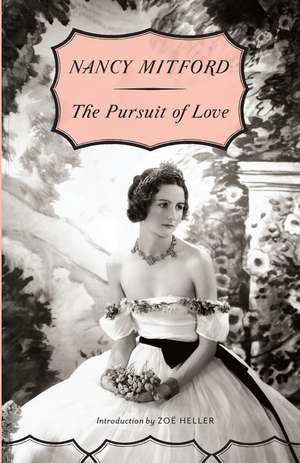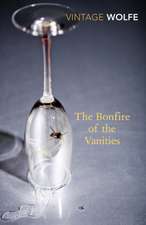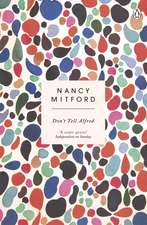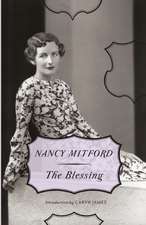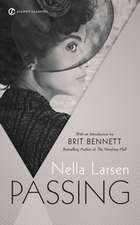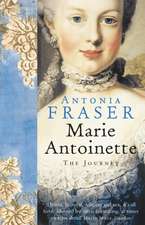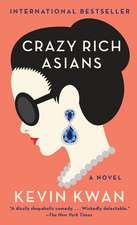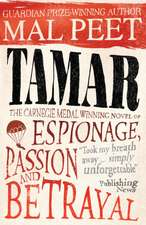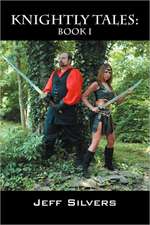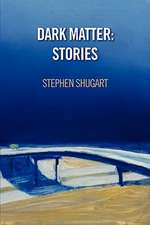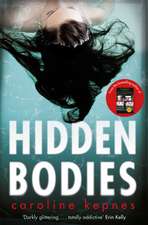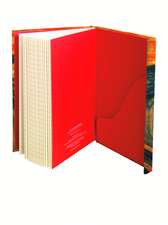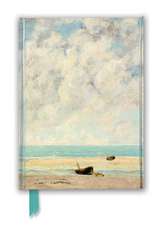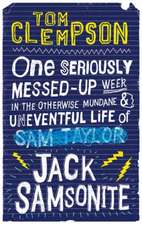The Pursuit of Love
Autor Nancy Mitford Jessica Mitford, Zoe Helleren Limba Engleză Paperback – 31 iul 2010
Mitford modeled her characters on her own famously unconventional family. We are introduced to the Radletts through the eyes of their cousin Fanny, who stays with them at Alconleigh, their Gloucestershire estate. Uncle Matthew is the blustering patriarch, known to hunt his children when foxes are scarce; Aunt Sadie is the vague but doting mother; and the seven Radlett children, despite the delights of their unusual childhood, are recklessly eager to grow up. The first of three novels featuring these characters, The Pursuit of Love follows the travails of Linda, the most beautiful and wayward Radlett daughter, who falls first for a stuffy Tory politician, then an ardent Communist, and finally a French duke named Fabrice.
| Toate formatele și edițiile | Preț | Express |
|---|---|---|
| Paperback (5) | 46.57 lei 26-32 zile | +15.06 lei 7-13 zile |
| Penguin Books – 6 iun 2018 | 46.57 lei 26-32 zile | +15.06 lei 7-13 zile |
| Penguin Books – 5 mai 2021 | 47.20 lei 26-32 zile | +24.72 lei 7-13 zile |
| Penguin Books – 25 noi 2015 | 52.14 lei 26-32 zile | +17.38 lei 7-13 zile |
| Penguin Books – 3 mar 2021 | 60.92 lei 26-32 zile | +25.10 lei 7-13 zile |
| Vintage Books USA – 31 iul 2010 | 89.91 lei 3-5 săpt. |
Preț: 89.91 lei
Nou
Puncte Express: 135
Preț estimativ în valută:
17.20€ • 18.01$ • 14.24£
17.20€ • 18.01$ • 14.24£
Carte disponibilă
Livrare economică 15-29 martie
Preluare comenzi: 021 569.72.76
Specificații
ISBN-13: 9780307740816
ISBN-10: 0307740811
Pagini: 214
Dimensiuni: 137 x 204 x 18 mm
Greutate: 0.2 kg
Editura: Vintage Books USA
ISBN-10: 0307740811
Pagini: 214
Dimensiuni: 137 x 204 x 18 mm
Greutate: 0.2 kg
Editura: Vintage Books USA
Notă biografică
Nancy Mitford, daughter of Lord and Lady Redesdale and the eldest of the six legendary Mitford sisters, was born in 1904 and educated at home on the family estate in Oxfordshire. She made her debut in London and soon became one of the bright young things of the 1920s, a close friend of Henry Green, Evelyn Waugh, John Betjeman, and their circle. A beauty and a wit, she began writing for magazines and writing novels while she was still in her twenties. In all, she wrote eight novels as well as biographies of Madame de Pompadour, Voltaire, Louis XIV, and Frederick the Great. She died in 1973. More information can be found at www.nancymitford.com.
Extras
Chapter One
There is a photograph in existence of Aunt Sadie and her six children sitting round the tea-table at Alconleigh. The table is situated, as it was, is now, and ever shall be, in the hall, in front of a huge open fire of logs. Over the chimney-piece plainly visible in the photograph, hangs an entrenching tool, with which, in 1915, Uncle Matthew had whacked to death eight Germans one by one as they crawled out of a dug-out. It is still covered with blood and hairs, an object of fascination to us as children. In the photograph Aunt Sadie’s face, always beautiful, appears strangely round, her hair strangely fluffy, and her clothes strangely dowdy, but it is unmistakably she who sits there with Robin, in oceans of lace, lolling on her knee. She seems uncertain what to do with his head, and the presence of Nanny waiting to take him away is felt though not seen. The other children, between Louisa’s eleven and Matt’s two years, sit round the table in party dresses or frilly bibs, holding cups or mugs according to age, all of them gazing at the camera with large eyes opened wide by the flash, and all looking as if butter would not melt in their round pursed-up mouths. There they are, held like flies in the amber of that moment—click goes the camera and on goes life; the minutes, the days, the years, the decades, taking them further and further from that happiness and promise of youth, from the hopes Aunt Sadie must have had for them, and from the dreams they dreamed for themselves. I often think there is nothing quite so poignantly sad as old family groups.
When a child I spent my Christmas holidays at Alconleigh, it was a regular feature of my life, and, while some of them slipped by with nothing much to remember, others were distinguished by violent occurrences and had a definite character of their own. There was the time, for example, when the servants’ wing caught fire, the time when my pony lay on me in the brook and nearly drowned me (not very nearly, he was soon dragged off, but meanwhile bubbles were said to have been observed). There was drama when Linda, aged ten, attempted suicide in order to rejoin an old smelly Border Terrier which Uncle Matthew had had put down. She collected and ate a basketful of yew-berries, was discovered by Nanny and given mustard and water to make her sick. She was then “spoken to” by Aunt Sadie, clipped over the ear by Uncle Matthew, put to bed for two days and given a Labrador puppy, which soon took the place of the old Border in her affections. There was much worse drama when Linda, aged twelve, told the daughters of neighbours, who had come to tea, what she supposed to be the facts of life. Linda’s presentation of the “facts” had been so gruesome that the children left Alconleigh howling dismally, their nerves permanently impaired, their future chances of a sane and happy sex life much reduced. This resulted in a series of dreadful punishments, from a real beating, administered by Uncle Matthew, to luncheon upstairs for a week. There was the unforgettable holiday when Uncle Matthew and Aunt Sadie went to Canada. The Radlett children would rush for the newspapers every day hoping to see that their parents’ ship had gone down with all aboard; they yearned to be total orphans—especially Linda, who saw herself as Katie in What Katie Did,the reins of the household gathered into small but capable hands. The ship met with no iceberg and weathered the Atlantic storms, but meanwhile we had a wonderful holiday, free from rules.
But the Christmas I remember most clearly of all was when I was fourteen and Aunt Emily became engaged. Aunt Emily was Aunt Sadie’s sister, and she had brought me up from babyhood, my own mother, their youngest sister, having felt herself too beautiful and too gay to be burdened with a child at the age of nineteen. She left my father when I was a month old, and subsequently ran away so often, and with so many different people, that she became known to her family and friends as the Bolter; while my father’s second, and presently his third, fourth and fifth wives, very naturally had no great wish to look after me. Occasionally one of these impetuous parents would appear like a rocket, casting an unnatural glow upon my horizon. They had great glamour, and I longed to be caught up in their fiery trails and be carried away, though in my heart I knew how lucky I was to have Aunt Emily. By degrees, as I grew up, they lost all charm for me; the cold grey rocket cases mouldered where they had happened to fall, my mother with a major in the South of France, my father, his estates sold up to pay his debts, with an old Rumanian countess in the Bahamas. Even before I was grown up much of the glamour with which they had been surrounded had faded, and finally there was nothing left, no foundation of childish memories to make them seem any different from other middle-aged people. Aunt Emily was never glamorous but she was always my mother, and I loved her.
At the time of which I write, however, I was at an age when the least imaginative child supposes itself to be a changeling, a Princess of Indian blood, Joan of Arc, or the future Empress of Russia. I hankered after my parents, put on an idiotic face which was intended to convey mingled suffering and pride when their names were mentioned, and thought of them as engulfed in deep, romantic, deadly sin.
Linda and I were very much preoccupied with sin, and our great hero was Oscar Wilde.
“But what did he do?”
“I asked Fa once and he roared at me—goodness, it was terrifying. He said: ‘If you mention that sewer’s name again in this house I’ll thrash you, do you hear, damn you?’ So I asked Sadie and she looked awfully vague and said: ‘Oh, duck, I never really quite knew, but whatever it was was worse than murder, fearfully bad. And, darling, don’t talk about him at meals, will you?’”
“We must find out.”
“Bob says he will, when he goes to Eton.”
“Oh, good! Do you think he was worse than Mummy and Daddy?”
“Surely he couldn’t be. Oh, you are so lucky to have wicked parents.”
There is a photograph in existence of Aunt Sadie and her six children sitting round the tea-table at Alconleigh. The table is situated, as it was, is now, and ever shall be, in the hall, in front of a huge open fire of logs. Over the chimney-piece plainly visible in the photograph, hangs an entrenching tool, with which, in 1915, Uncle Matthew had whacked to death eight Germans one by one as they crawled out of a dug-out. It is still covered with blood and hairs, an object of fascination to us as children. In the photograph Aunt Sadie’s face, always beautiful, appears strangely round, her hair strangely fluffy, and her clothes strangely dowdy, but it is unmistakably she who sits there with Robin, in oceans of lace, lolling on her knee. She seems uncertain what to do with his head, and the presence of Nanny waiting to take him away is felt though not seen. The other children, between Louisa’s eleven and Matt’s two years, sit round the table in party dresses or frilly bibs, holding cups or mugs according to age, all of them gazing at the camera with large eyes opened wide by the flash, and all looking as if butter would not melt in their round pursed-up mouths. There they are, held like flies in the amber of that moment—click goes the camera and on goes life; the minutes, the days, the years, the decades, taking them further and further from that happiness and promise of youth, from the hopes Aunt Sadie must have had for them, and from the dreams they dreamed for themselves. I often think there is nothing quite so poignantly sad as old family groups.
When a child I spent my Christmas holidays at Alconleigh, it was a regular feature of my life, and, while some of them slipped by with nothing much to remember, others were distinguished by violent occurrences and had a definite character of their own. There was the time, for example, when the servants’ wing caught fire, the time when my pony lay on me in the brook and nearly drowned me (not very nearly, he was soon dragged off, but meanwhile bubbles were said to have been observed). There was drama when Linda, aged ten, attempted suicide in order to rejoin an old smelly Border Terrier which Uncle Matthew had had put down. She collected and ate a basketful of yew-berries, was discovered by Nanny and given mustard and water to make her sick. She was then “spoken to” by Aunt Sadie, clipped over the ear by Uncle Matthew, put to bed for two days and given a Labrador puppy, which soon took the place of the old Border in her affections. There was much worse drama when Linda, aged twelve, told the daughters of neighbours, who had come to tea, what she supposed to be the facts of life. Linda’s presentation of the “facts” had been so gruesome that the children left Alconleigh howling dismally, their nerves permanently impaired, their future chances of a sane and happy sex life much reduced. This resulted in a series of dreadful punishments, from a real beating, administered by Uncle Matthew, to luncheon upstairs for a week. There was the unforgettable holiday when Uncle Matthew and Aunt Sadie went to Canada. The Radlett children would rush for the newspapers every day hoping to see that their parents’ ship had gone down with all aboard; they yearned to be total orphans—especially Linda, who saw herself as Katie in What Katie Did,the reins of the household gathered into small but capable hands. The ship met with no iceberg and weathered the Atlantic storms, but meanwhile we had a wonderful holiday, free from rules.
But the Christmas I remember most clearly of all was when I was fourteen and Aunt Emily became engaged. Aunt Emily was Aunt Sadie’s sister, and she had brought me up from babyhood, my own mother, their youngest sister, having felt herself too beautiful and too gay to be burdened with a child at the age of nineteen. She left my father when I was a month old, and subsequently ran away so often, and with so many different people, that she became known to her family and friends as the Bolter; while my father’s second, and presently his third, fourth and fifth wives, very naturally had no great wish to look after me. Occasionally one of these impetuous parents would appear like a rocket, casting an unnatural glow upon my horizon. They had great glamour, and I longed to be caught up in their fiery trails and be carried away, though in my heart I knew how lucky I was to have Aunt Emily. By degrees, as I grew up, they lost all charm for me; the cold grey rocket cases mouldered where they had happened to fall, my mother with a major in the South of France, my father, his estates sold up to pay his debts, with an old Rumanian countess in the Bahamas. Even before I was grown up much of the glamour with which they had been surrounded had faded, and finally there was nothing left, no foundation of childish memories to make them seem any different from other middle-aged people. Aunt Emily was never glamorous but she was always my mother, and I loved her.
At the time of which I write, however, I was at an age when the least imaginative child supposes itself to be a changeling, a Princess of Indian blood, Joan of Arc, or the future Empress of Russia. I hankered after my parents, put on an idiotic face which was intended to convey mingled suffering and pride when their names were mentioned, and thought of them as engulfed in deep, romantic, deadly sin.
Linda and I were very much preoccupied with sin, and our great hero was Oscar Wilde.
“But what did he do?”
“I asked Fa once and he roared at me—goodness, it was terrifying. He said: ‘If you mention that sewer’s name again in this house I’ll thrash you, do you hear, damn you?’ So I asked Sadie and she looked awfully vague and said: ‘Oh, duck, I never really quite knew, but whatever it was was worse than murder, fearfully bad. And, darling, don’t talk about him at meals, will you?’”
“We must find out.”
“Bob says he will, when he goes to Eton.”
“Oh, good! Do you think he was worse than Mummy and Daddy?”
“Surely he couldn’t be. Oh, you are so lucky to have wicked parents.”
Recenzii
“Mitford, describing in a tart and easy fashion the diverting activities of a titled English family, is mocking, good-tempered, and very funny.” —The New Yorker
“The deliriously foolish story of an inane but charming girl and her outrageously eccentric family.” —The New York Times
“Utter, utter bliss.” —The Daily Mail (London)
“The deliriously foolish story of an inane but charming girl and her outrageously eccentric family.” —The New York Times
“Utter, utter bliss.” —The Daily Mail (London)
Descriere
One of Mitford's most enduringly popular works, "The Pursuit of Love" is a classic comedy about growing up and falling in love among the privileged and eccentric. This edition includes an Introduction by the author of "The Believers" and "What Was She Thinking? Notes on a Scandal."
